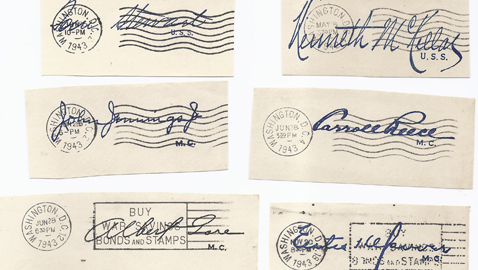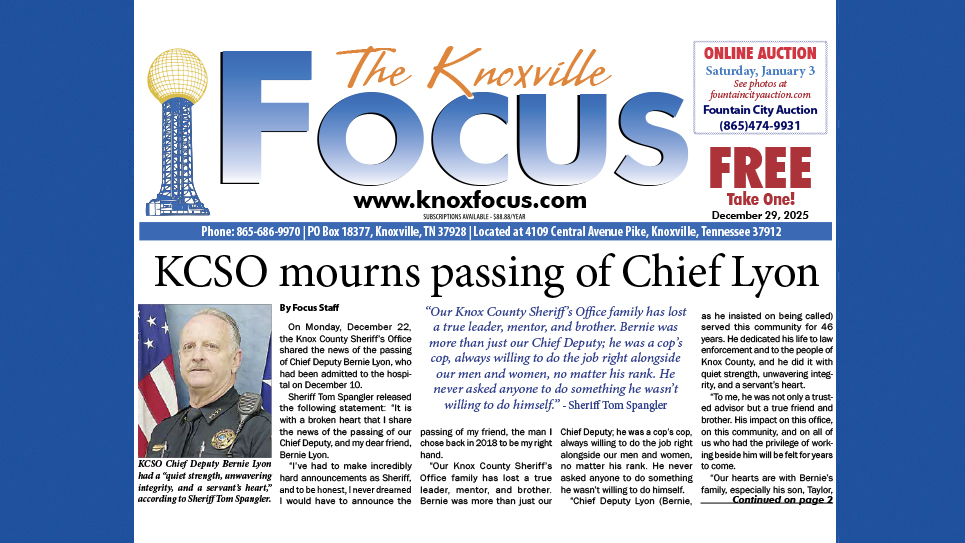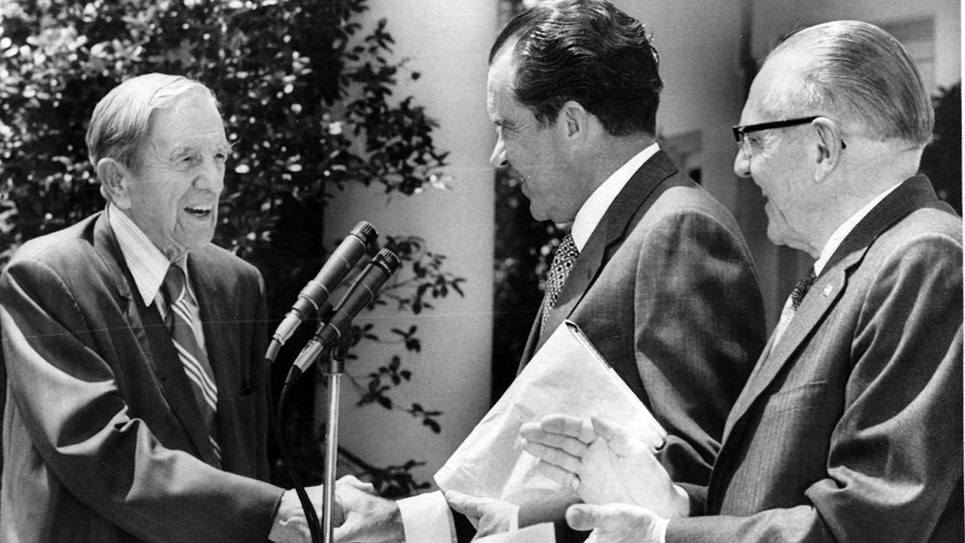
From the author’s personal collection.
Set of Congressional free frank mailing signatures of the Tennessee delegation.
Harold Earthman had been a successful businessman, served for a brief time in the Tennessee House of Representatives and as the County Judge (or County Mayor) of Rutherford County. A portly man with prematurely gray hair, Earthman easily won the Democratic primary to succeed Congressman Jim Nance McCord who had been elected Tennessee’s governor after a single term in the U. S. House of Representatives.
Like his predecessor, Earthman was confined to one term in Congress. He sought reelection in 1946 but faced a strong opponent in the Democratic primary in Joe L. Evins. Evins was the son of long-time State Senator Edgar Evins and was fresh from having fought in World War II. Many returning veterans had come home and sought public office and as a freshman Congressman, Harold Earthman had not consolidated his hold in the Fifth Congressional District.
Evins carried nine of the eleven counties comprising the Fifth Congressional District and would go on to serve in the Congress for thirty years, finally retiring in 1976 to make way for Albert Gore, Jr.. As for Harold Earthman, his political career was over and he resumed his business interests and law practice before dying in 1987.
J. Percy Priest was the Congressman from Tennessee’s Sixth District, which was largely composed of Nashville and a few surrounding counties. From 1908 until his death in 1936, the district was represented in Congress by Joseph W. Byrns. Byrns would rise to the very height of power inside the U. S. House of Representatives, becoming Speaker in 1935. Following Byrns’s sudden death, Richard M. Atkins had been elected to succeed him, winning the primary by a scant thirteen votes. Atkinson had been the Attorney General for Davidson County prior to his election to Congress and was a controversial figure. Atkinson was especially disliked by Tennessee’s senior United States Senator Kenneth D. McKellar.
Atkinson served one term in Congress before losing to his predecessor’s son and namesake, Joseph W. Byrns, Jr. in 1938. The younger Byrns edged out Congressman Atkinson in the primary and in a heavily Democratic district, went on to win the general election.
Joseph W. Byrns, Jr. might have carried his famous father’s name, but certainly didn’t inherit his father’s political skills. Congressman Byrns had grown up largely in Washington, D. C. and being an adored only child, seemed to feel some disdain for the people he represented. Unfortunately, he was not able to mask that disdain and during his 1938 reelection campaign, referred to the “clodhoppers” in his district. Byrns had been challenged in the Democratic primary that year by two serious opponents, former Congressman Richard Atkinson and Tennessee Utilities Commissioner W. D. “Pete” Hudson. Congressman Byrns only won the nomination with a plurality and confidently expected to be reelected in the fall. J. Percy Priest, a former reporter for the Nashville Tennessean, was waging a campaign in the general election as an Independent. It was a bold gamble and ordinarily an Independent would have little chance against a sitting Congressman of the majority party, especially in so heavily a Democratic district.
Under funded, with little support from the establishment, Priest shrewdly used Congressman Byrns’s overconfidence and contempt for his constituents to win a surprise victory in the 1940 general election. Priest, who was once described as being as “ugly as homemade sin”, yet having a sweet disposition and heart as big as the outdoors, remained a highly popular figure inside his district for the rest of his life. Percy Priest, like so many other Congressmen who are highly popular inside their respective districts, was not defeated nor did he choose to retire; it was death that took him out of the Congress.
Percy Priest, long in delicate health, had gone to the hospital for surgery on an ulcer, but died unexpectedly several days later in October of 1956. Those traveling to Nashville can hardly miss the enormous J. Percy Priest Dam.
William Wirt Courtney had represented Tennessee’s Seventh Congressional District since winning a special election in 1937. Named for William Wirt, an Attorney General of the United States and reputedly one of the best lawyers of his time, Wirt Courtney graduated from Vanderbilt Law School, as well as the Faculte de Droit at the Sorbonne in France. After having served in the American Expeditionary Force in World War I, Courtney returned home to Franklin, Tennessee where he established a law practice. By 1932, Courtney was Adjutant General of Tennessee, as well as holding the rank of brigadier general in the Tennessee National Guard.
Courtney was elected as both a Circuit Court judge and Chancellor during the early 1930s and when Congressman Clarence W. Turner died in 1939, Courtney ran for and won a seat in Congress. Congressman Courtney was a strong supporter of President Franklin D. Roosevelt and the New Deal. Courtney was routinely reelected until 1948 when he faced James “Pat” Sutton in the Democratic primary. Like Joe L. Evins, Sutton was a returning veteran of World War II. Sutton had in fact been a highly decorated veteran, having been awarded the Silver Star, Distinguished Service Cross and the Purple Heart. Pat Sutton was also a very effective speaker and possessed considerable charisma; that combined with his war record, made him a strong candidate.
Sutton was more conservative than Congressman Courtney and by 1948, President Franklin Delano Roosevelt was dead. Courtney’s record as an old New Dealer did not prove to be especially helpful to him and he lost the primary by fifty-eight votes out of more than forty thousand cast.
Pat Sutton enjoyed a brief, but meteoric rise, eventually leaving Congress after only six years to run against Senator Estes Kefauver in 1954. Sutton’s Senate race was quite well funded and he used the then novel gimmick of campaigning by helicopter and holding marathon campaign events on the new medium of television. Sutton castigated Kefauver for his liberalism, but lost badly.
Sutton attempted to regain his seat in Congress in 1956, challenging his successor, freshman Congressman Ross Bass. Bass beat back Sutton’s challenge easily and Sutton went on to be elected Sheriff of Lawrence County. Evidently Sheriff Sutton’s term of office was, to say the least, tumultuous with Sutton and his brother both eventually being indicted for counterfeiting.
Sutton’s last campaign was in 1976 when he faced his old rival Ross Bass in the Democratic primary for the right to face Republican incumbent Robin Beard. Sutton won only a fraction of the vote and it was the end of his political career and he later moved to Michigan where he died in 2005.
Congressman Tom Murray hailed from Jackson, Tennessee, the scion of a highly influential political family. Murray was first elected to Congress in 1938 when Congressman Herron Pearson retired. Thomas Jefferson Murray would remain in Congress for the next twenty-eight years.
Murray rose through the seniority system to occupy the Chairmanship of the House Post Office Committee, yet by the 1960s he was ailing. Although his family pressed him to retire, Murray, a bachelor, refused to leave Congress voluntarily. Congressman Murray lost a close race in 1966 to a young state legislator named Ray Blanton. Following his defeat, Tom Murray returned home to Jackson, Tennessee where he died in 1971.
Jere Cooper was one of the most powerful members of Tennessee’s delegation to Congress. First elected in 1928, Cooper had risen through the ranks to occupy the Chairmanship of the most powerful committee in the House, if not all of Congress: the Ways and Means Committee. All tax legislation in Congress is supposed to emanate from the Ways and Means Committee and Jere Cooper was clearly the most influential member of Tennessee’s Congressional delegation by 1955.
A strong national Democrat, Congressman Cooper was strongly supportive of both Presidents Franklin Roosevelt and Harry Truman. Throughout his long career in Congress, Cooper rarely faced political trouble back home. Occasionally he might find himself pressed by a challenger, but in 1956 despite his Chairmanship of the Ways and Means Committee, Congressman Cooper was presented with a real fight on his hands. Robert “Fats” Everett was a native of Obion County and had been the Circuit Court Clerk while still in his twenties. Everett had been the Administrative Assistant to Senator Tom Stewart and held the same position after Gordon Browning returned to the governor’s office in 1949. Following Browning’s defeat by Frank Clement in 1952, Everett became the Executive Director of the Tennessee County Service’s Association. A shrewd observer of politics and a jovial personality, Everett quite nearly beat Congressman Cooper in the 1956 primary.
As it turned out, Fats Everett’s entry into the Congress was merely delayed, as Congressman Jere Cooper died of a heart attack in 1957. Cooper was succeeded by Everett who remained in Congress until his own death from a heart attack in 1969.
Clifford Davis was the Congressman from Tennessee’s Tenth District, which was Shelby County and the domain of Edward Hull Crump. Davis had long been a member of the Crump machine, serving in various local offices before his election to Congress in 1940 after Congressman Walter Chandler had been elected Mayor of Memphis. Davis was a highly popular local figure in Memphis and Shelby County and was the last vestige of the Crump machine to survive in public office.
Davis was one of the House members wounded while on the floor when Puerto Rican separatists opened fire from the galleries. Congressman Davis recovered and continued to serve in Congress until 1964. Crump had died in 1954 and the machine he had so carefully built barely survived him. Clifford Davis was one of the few remnants of the Crump machine and at age sixty-seven faced a challenge from George Grider. Grider managed to beat Davis, removing the last of the Crump machine from office in Shelby County.
For those anti-Crump Democrats, it was a bittersweet victory, as the rise of the Tennessee Republican Party soon buried Congressman George Grider. Many of the old Crump allies had grown more conservative over the years and allied with the Republicans, elected Dan Kuykendall in 1966. Kuykendall would serve in Congress for the next eight years when the pendulum swung back and a new machine was born; that of Harold Ford.
Throughout the past, Tennessee has produced some remarkable leaders and a number of colorful political figures. Tennessee’s Congressional delegation in 1945-46 boasted some highly influential and durable political figures that would help shape the future for decades to come.






